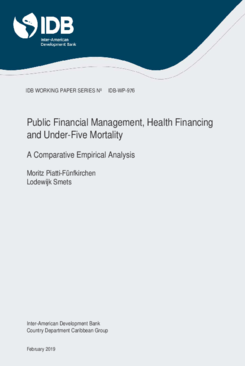Public Financial Management, Health Financing and Under-Five Mortality: A Comparative Empirical Analysis
Date
Feb 2019
This study examines the relationship between public financial management (PFM), the financing of health interventions and health outcomes. Specifically, the paper econometrically tests whether the effect of PFM on under-five mortality depends on the relevance of public sector health financing. Employing OLS on a sample of 215 observations indicates that a one unit increase in PFM quality reduces the U5 mortality rate with about 14 deaths per 1,000 live births. For countries that channel at least, 75 percent of health expenditures through the government system this rate increases to 17 deaths per 1,000 child births. Results are robust to using an alternative dependent variable, adding year fixed effects, a sensitivity test where the health financing threshold is varied and a falsification test that verifies whether findings are driven by unobserved governance aspects. Furthermore, the paper provides a comparative analysis for Latin America and Caribbean (LAC), a region which remains mostly overlooked in the literature. The findings for LAC are broadly consistent with the global sample, though less pronounced and without a differential effect for countries across the financing threshold. Overall, the evidence indicates that the pursuit of universal health coverage and the progress toward related SDGs will be more costly if enabling systems are not in place.




